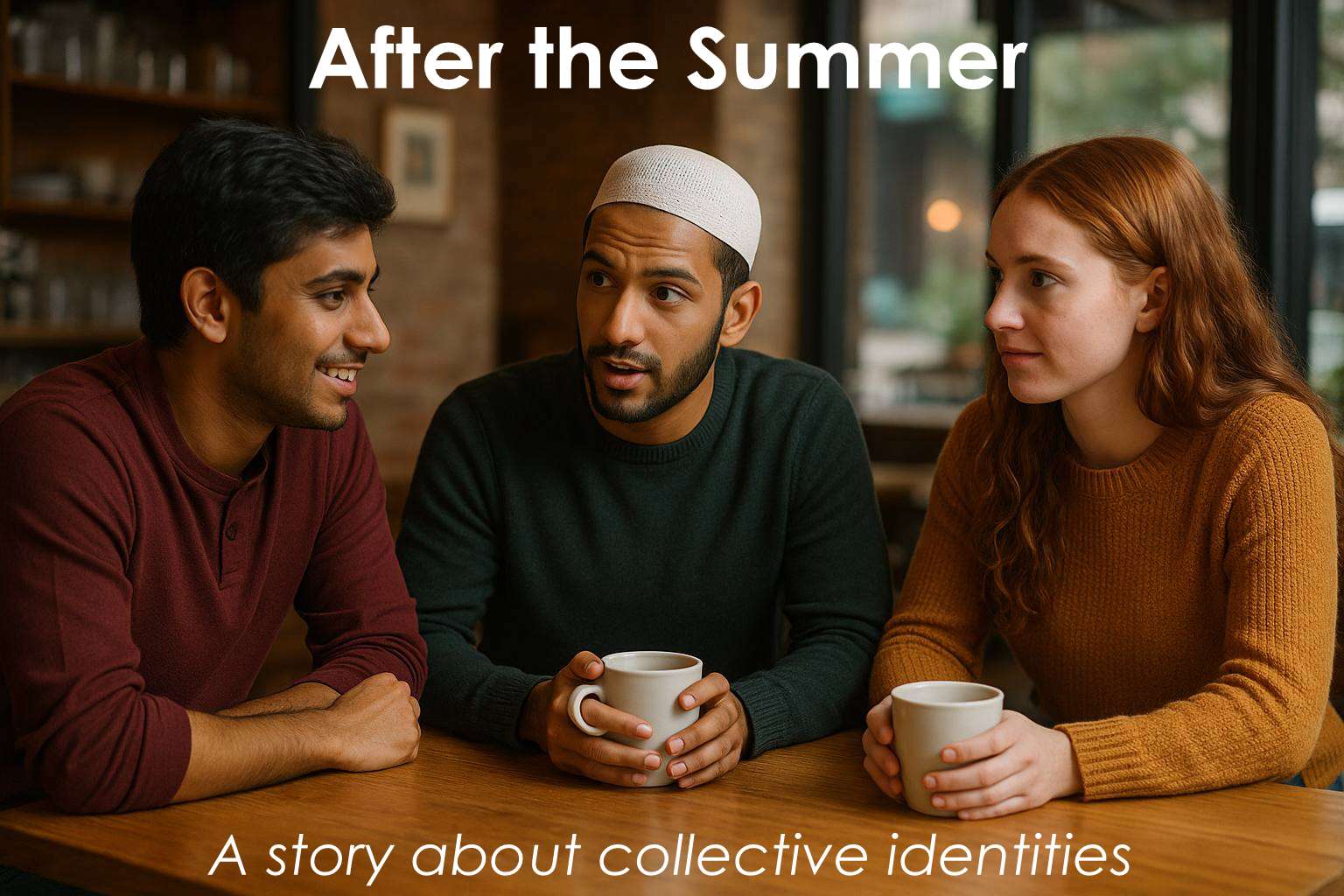
When they met first, it felt accidental, but later each of them would remember tiny details as if they’d been signs.
It was a first-year elective at UCD called “Religion and the Modern World.” The tutor had put them into a group of three for a presentation on religious pluralism in cities. Aarav, from India, Hindu; Yasir, from Sudan, Muslim; and Bríd, from Tory Island, Catholic. Dublin, which often treated foreignness with a shrug, had put them at the same table.
After class they went to the restaurant in the Student Centre because it was raining and they didn’t want to go back to their separate residencies. It was easy from the start. All three were away from home, all three came from places where religion was not a Sunday option but the air itself, and all three found it slightly funny to be enrolled in a module that spoke about “religious identity” as if it were a light jacket.
“So,” said Bríd, stirring her tea, “is it weird for you to drink a beer here?”
“I don’t drink,” said Yasir, smiling. “Not even for Irish hospitality.”
“Fair,” said Aarav. “I’ll drink for all of us, then.”
They laughed. It was that kind of semester — light, cosmopolitan, underlined by the certainty that the real problems were elsewhere. They compared festivals: Diwali, Eid, Christmas. They compared foods. They joked about Irish weather, about the buses, about how UCD was “almost in Wicklow.”
What none of them saw clearly then was how much distance was being created by speaking only in English. English was the water-level where they all floated. Underneath, things waited.
Exams came, and then May, and then the cheapest flights home.
Aarav in Jaipur
The heat hit him first, and then the colour. Dublin in May had been soft and green; Jaipur in May was hard light and marigold.
His mother hugged him in the doorway.
“कैसा रहा, डबलिन?”
“अच्छा था, माँ. सब ठीक था.”
His father emerged from his room, glasses low on his nose.
“पढ़ाई ठीक चल रही है?”
“हाँ, पापा. बहुत अच्छा चल रहा है. वहाँ बहुत डाइवर्सिटी है.”
At dinner, the talk was easy — fees, the course, Irish food. But India in 2025 was full of louder conversations, and his parents did not live in a vacuum.
His uncle arrived the second evening, a man who watched too many panel shows.
“वहाँ हिंदू कितने हैं? या सब ईसाई और मुसलमान?”
“वहाँ सब हैं, मामा. और कोई पूछता भी नहीं.”
“अच्छा? पूछना चाहिए. धर्म छिपाने की चीज़ नहीं है. तुम मंदिर जाते हो वहाँ?”
“कभी-कभी. बस एक छोटा-सा मंदिर है.”
“जाया करो. अपनी पहचान याद रखनी चाहिए. ये सब वेस्ट जाके बच्चे भूल जाते हैं.”
Later that night his mother sat on the bed.
“देखो, आरव, दोस्त बनाओ, सबके साथ रहो. लेकिन अपनी बात समझौता करके नहीं. तुम हिंदू हो. ये तुम्हें वहाँ कोई नहीं बताएगा.”
He nodded, because it was easier to nod.
From Jaipur, Dublin no longer felt so simple.
Yasir in Omdurman
Khartoum was dusty and bright, the smell of the Nile mixed with diesel. His mother embraced him tightly.
“كانت جميلة يا أمي. باردة، لكن جميلة.”
“أكلتم الحلال؟”
“نعم، أغلب الوقت. في مطعم تركي قريب من الجامعة.”
His father looked up from his newspaper.
“أصلي، يا أبي.”
#“الحمد لله.”
One cousin frowned when Yasir mentioned Aarav.
“لا تتكلم هكذا، يا طارق. هو محترم.”
“أنا لا أهاجمه، لكن هذا شرك.”
That night his father said quietly,
Yasir promised,
Bríd on Tory Island
The ferry ride always reset her. The mainland shrank; Tory grew. Her father met her at the pier.
“Conas mar atá tú, a Bhríd?”
“Tá mé go maith, a Dhaid. Bhí sé fada.”
“Céard é an coláiste ansin i mBaile Átha Cliath? An bhfuil tú ag freastal ar an Aifreann fós?”
“Tá… uaireanta.”
“Níl sé deacair má tá sé tábhachtach.”
In the kitchen her mother said,
“Chonaic mé ar an nuacht faoi na hIndiaigh agus na Moslamaigh ag troid.”
“Tá cara agam Indiach. Agus Moslamach freisin. Tá siad breá.”
“B’fhéidir, ach ní hionann sin is a gcreideamh a bheith fíor.”
At Mass, an older neighbour asked,
“An bhfuil tú fós ag caitheamh do chroise?”
“Uaireanta.”
“Ná déan dearmad. Tá orainn seasamh dár gcreideamh.”
Back in Dublin
September smelled of wet leaves and new notebooks. They found each other in the concourse, all smiles and jet-lag.
“Hey!” said Aarav.
“Hey yourself,” said Bríd.
“Assalamu alaikum — sorry, hi,” said Yasir.
Coffee, pastries, catching-up. Everything polite, easy. But each heard the others through the summer’s filter.
Later, in the library, their new project — “Shared Sacred Spaces” — collapsed into argument.
Aarav: “We could do Sufis and Hindus sharing shrines.”
Yasir: “I’m not sure that’s right — some of those practices aren’t Islamic.”
Aarav: “So you’re saying it’s wrong?”
Yasir: “I’m saying from an Islamic perspective—”
Aarav: “From your perspective.”
Bríd: “Lough Derg? We could do an Irish example.”
Silence, tension. Then slow recognition.
Bríd: “They told you at home you’re right, didn’t they?”
Aarav: “Yeah. That’s the problem.”
Yasir: “In Sudan they said the same.”
Bríd: “On Tory too.”
They stared, realising they’d each imported their summers.
Finally Bríd said, “Then maybe that’s the project.”
They wrote about how people try to share spaces but carry home boundaries with them — like the three of them.
By December they still met sometimes for coffee, still texted:
“In the café. You around?”
“Ten mins.”
“Be there.”
Always in English — the only language none of their families could overhear, the only one that didn’t insist on being the centre.